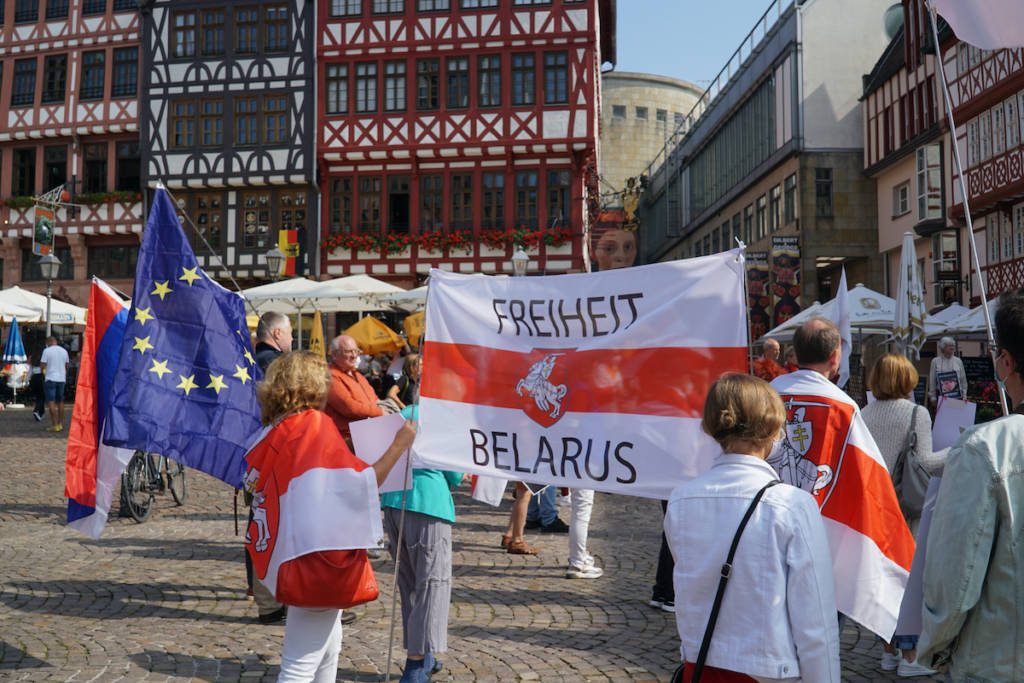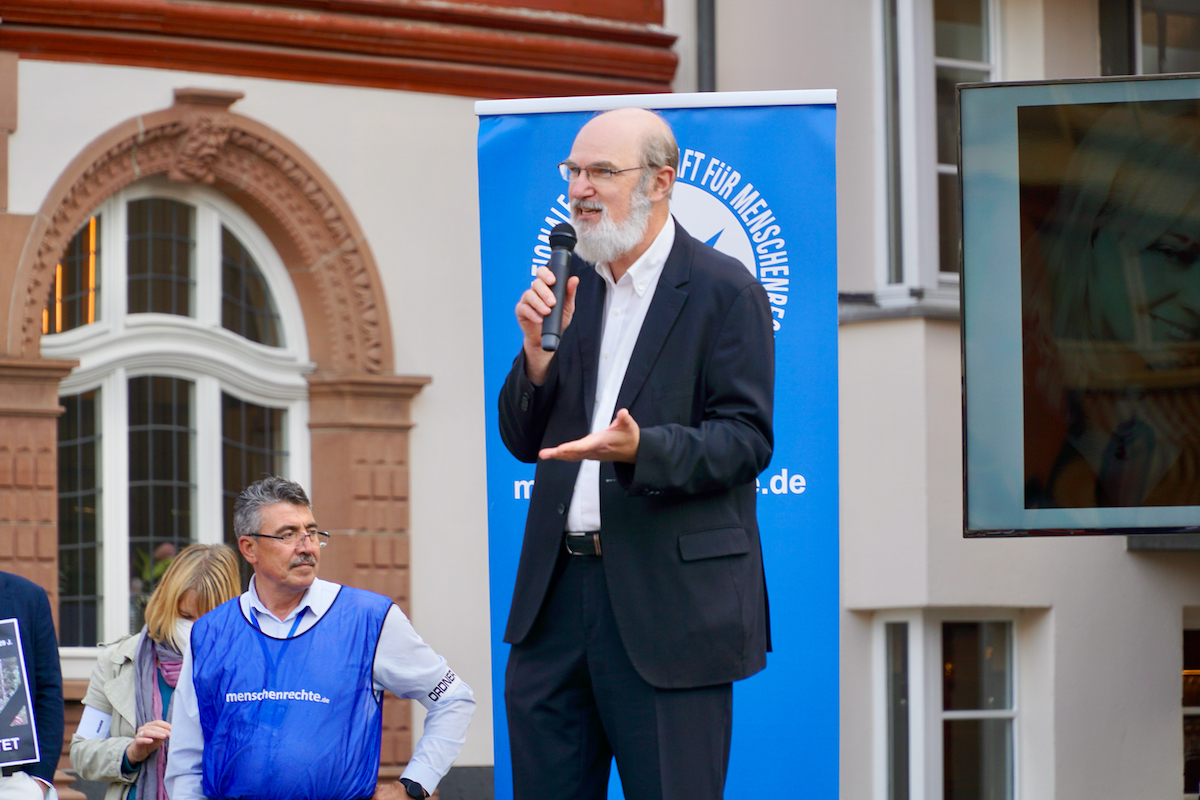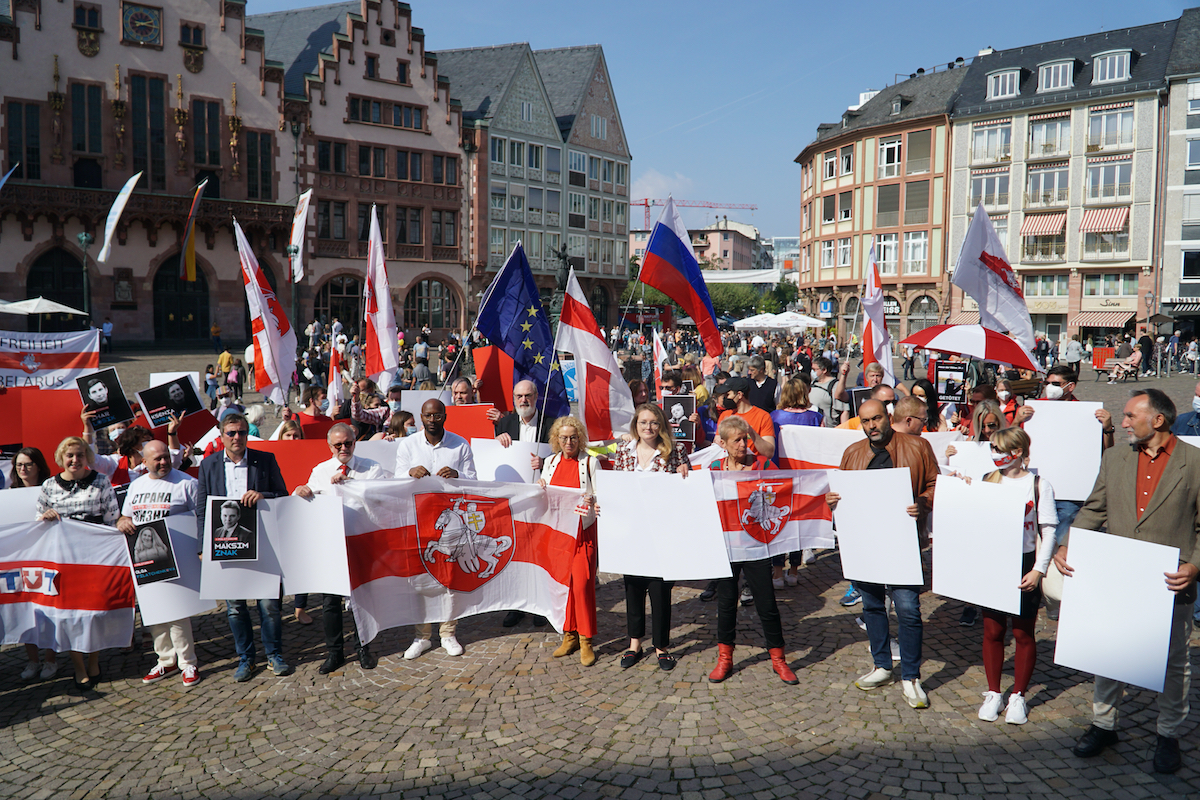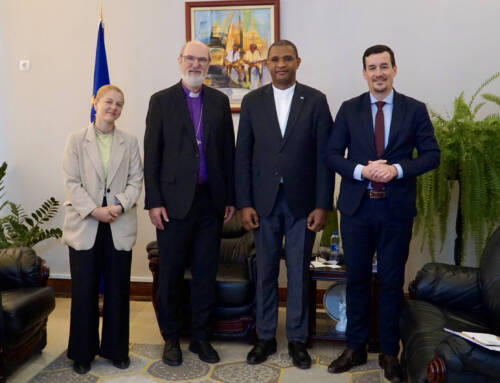NEWS FROM THE PRESIDENT

Looking back: A year ago, Thomas Schirrmacher spoke together with top politicians at large-scale demonstration in Frankfurts historic center
Together with representatives of Belarusian civil society, politicians from various parties and experts on Eastern Europe, the International Society for Human Rights (ISHR) showed “unconditional solidarity” with political prisoners and others persecuted by Alexander Lukashenko’s regime at Römerberg in Frankfurt on Saturday. Testimonies and evidence of the harshest repression, brutal use of force, torture and murder by state security forces are staggering. More than 500 people have been locked up for a year without legal representation. The ISHR notes that the fate of the Belarusian democracy movement is crucial to the security and future of the EU.

The victory of the Belarusian democratic movement has existential significance for Putin
The Belarusian dictator would be virtually powerless without Putin and his allies. The victory of the democratic movement in brotherly Belarus, followed by the establishment of a democratic government, will undoubtedly revive the suppressed democratic movement in Russia, the ISHR believes. While critics such as Maria Kolesnikova are vilified and locked up by the Belarusian regime, the EU is openly mocked as a community of values. For example, the Belarusian dictator and Putin were amused on television by the EU’s “outburst of anger” after a Belarusian fighter jet hijacked a commercial airliner in European airspace to arrest 25-year-old journalist Roman Protasevich. “Thus, a tug-of-war between democracy and dictatorship has been going on in the heart of Europe for a year now,” stresses Dr. Carmen Crush-Grün, the ISHR’s expert on Eastern Europe.
SPD member of parliament Ulli Nissen spoke on behalf of her party: “We support those who are fighting for freedom and democracy in Belarus”. She admired the courage and determination with which these people resist the autocratic regime. Nissen advocated the continuation of the EU economic sanctions to enforce specific demands. “We cannot continue to tolerate the existence of despotic arbitrariness in Europe in the 21st century.” She said the situation in the country was worrying. In response to a wave of public protests against the rigging of Alexander Lukashenko’s re-election during the presidential election, the dictator decided to act through repression, she said. “Since then the repression against the democratic movement in Belarus has reached unimaginable proportions,” Nissen said during the rally. Under him, opposition politicians, democracy advocates, critical journalists and even children and teenagers have been imprisoned, such as during the peaceful Women’s March demonstration. “Tens of thousands have been imprisoned, beaten and forced into exile,” the politician lamented. Many of them were held in overcrowded prison cells for long months without trial. Nissen also recalled the fate of Maria Kolesnikova: after a show trial in early September, a court in Minsk found the opposition activist guilty of anti-constitutional conspiracy to seize power and sentenced her to eleven years in a penal colony. Kolesnikova had long worked as a cultural manager in Stuttgart and had become a symbolic figure of the protest movement. Nissen also recalled the abduction of journalist and blogger Roman Protasevich and his girlfriend in a forced landing of a passenger plane in May this year.

Standing in front of Frankfurt’s St. Paul’s Church, a symbol of the early democratic movement in Germany, Martina Feldmeier, a member of the state parliament from the Greens party, stressed that after last year’s rigged elections in Belarus, which led to protests by hundreds of thousands, there is a spirit of optimism in civil society. Demonstrators have shown courage by going to the streets and showing that they want changes, she said. “They want a peaceful change in the balance of power and I have the utmost respect for them.” The EU sanctions must become bolder and tougher, she said. “We cannot let the Belarusian people down,” Martine urged, referring to the democratic values of today’s Europe and the history of Frankfurt.
“We support the people of Belarus in the European Parliament on all party lines,” emphasized CDU member of the EP Michael Gahler. This shows how widespread is the support for the just democratic struggle of these people in Belarus.
“We in the European Parliament are pushing the Council of Ministers, the Foreign Affairs Service and Member States to implement the fifth package of sanctions now.”
He expressed confidence that those who would have been sentenced to long prison sentences for expressing their opinions would not have to serve this term. However, sanctions should not only apply to future contracts, but also to existing agreements. In particular, he sharply criticised: “Lukashenko is criminally using poor refugees from Iraq to pressure Lithuania, Latvia and Poland, which is double inhumanity. The Belarusian regime smuggles them there and takes them to the border zone with the EU. Refugees arriving in Lithuania receive humanitarian aid from the local ISHR section there.
“We want to make sure that the next package of sanctions will be even more effective,” Gahler promised.
“We, Belarusian women, want to live in an independent, democratic Belarus, and we need the solidarity and determination of the European Union and support in this struggle for our right to self-determination and the right to live in a free country without violence,” said Olga Karatch, founder of the Belarusian human rights organisation “Nash Dom”.
The opposition is paying a high price for its commitment to freedom and democracy: about 200,000 citizens of their homeland live in exile and about 40,000 are subjected to violence. Their association is aware of about 700 political prisoners.
“However, we do not yet have exact figures on how many people have been killed, raped or abducted, including even children,” she said with a sigh. “I have a dream that soon we will be part of Western civilisation. We don’t want to be part of the Russian world.”
“We cannot stand by and watch as the dignity of people in Belarus is trampled in this cradle of democracy,” said the newly elected mayor of Frankfurt and head of diversity, anti-discrimination and social cohesion Dr. Nargess Eskandari-Grünberg, referring to the St. Paul’s Church, where the first German parliament met in 1848–1849. She admires the courage of the large number of demonstrators in Belarus who risked their lives and freedom to stand up for democracy and human rights. “Dear people of Belarus, we are proud of you,” was her message to them.

Professor Thomas Schirrmacher, President of the International Council of the ISHR, said: “Democracy has always been imposed from the bottom up. Therefore, democratically elected politicians at the international level should use their power to send a “stop signal” to the dictator Lukashenko. He stressed that the human rights organisation has sections in the successor states of the former Soviet Union, including Belarus.
“We have been working with them for decades. They are in need and some of them have already left the country.”
He concluded by calling on people to honour with a minute of silence those opposition figures in Belarus who have dedicated their lives to the freedom of their people.
Peter Heidt, FDP member of the parlaiment, expressed concern over Russian interference in favour of Lukashenko and called on Germany to act more decisively. FDP wants to support the democratic movement in Belarus by “increasing the amount of information offered by Deutsche Welle, providing financial support to civil society and facilitating the issuance of visas,” Heidt specified. The EU should also maintain the signal effect of its sanctions and discuss tightening them, said the politician from nearby Bad Neuheim.
“As part of our efforts to support civilians, the ISHR and German Bundestag patronage programmes are of particular importance.”
As part of the Parliamentary Protection Programme, Peter Heidt has taken over the patronage of Victor Babariko.
Karyna Shchamialiova from the association RAZAM (“together”) called for the immediate release of political prisoners, an end to violence and persecution and the holding of democratic elections in Belarus.
“With the help of stun grenades, truncheons and torture in prisons, Lukashenko has suppressed the Belarusian democratic movement. However, we continue to fight because we know that he and his thugs have no future.”
According to her, almost all non-profit organizations have been banned, including educational institutions, associations of people with disabilities and other public organizations. The dictator has become a tyrant who does not even hesitate to kidnap and kill opposition representatives abroad.

Omid Nouripour, member of the Bundestag and foreign policy representative of the Union 90/The Greens, made it clear in his speech that “we must not forget the people of Belarus”. Nouripour, who took political patronage over political prisoner Sergey Petruchkin, appealed to the only protection that persecuted people in Belarus have: attention. The Frankfurt politician emphasised two central points of the signed resolution: firstly, the results of the elections must not be recognised, and secondly, the political prisoners must finally be released. Furthermore, Nouripour made it clear that what is important now is not only attention and the release of prisoners, but also political pressure:
“There must be no impunity, Lukashenko and his henchmen must know that they cannot live peacefully, free and prosperously for the rest of their lives and will have to atone for all the crimes they have committed, that is why it is so important to document crimes, that is why it is important to insist that they cannot get away with it, that is why it is important that European states come together”.
Nouripour gave special thanks to Olga Karatch, without whose decades of work he would not have been on this stage. Standing beside these courageous women is the task of all Europeans these days; the colours of the Belarusian democratic movement are the colours of freedom in Europe today, Nouripour said.
Manfred Sapper, editor-in-chief of “Osteuropa” magazine, compared the current situation in Belarus to that of Poland in 1989 in historical perspective: “We overestimate the stability of this regime. If we have learned anything from the perspective of Germany or Eastern Europe, it is that we always tend (and dictators do it themselves) to overestimate the stability and strength of their regime. We saw this in 1989, how quickly Poland fell then.” That is why Sapper urged everyone not to give up, to be patient and not to despair. The East European researcher referred to the success of the protest movements in the GDR and Hungary:
“We saw it in Hungary, we saw it ourselves in the GDR at the very end, which also tried to hold on to power with the Stasi and other instruments of repression. […] If we take Poland as an example in a historical perspective, we can see that the Belarusian situation is by no means particularly difficult, but it is not hopeless either.”
The rally painted Frankfurt’s Römerberg red and white and sent a strong message of solidarity to all Belarusians in Europe.
“We stand in solidarity with all those who are politically persecuted and join forces to expose and fight crimes against humanity,” summed up Valerio Krüger, spokesman for the ISHR.
Together with the co-organisers – Kulturverein Belarus e.V. and member of parliament Martina Feldmeier and her team – we can rightly say that it was a very successful event. The ISHR would like to thank all the volunteers, individuals and companies who supported the rally materially and financially.

















